Abstract
Little is known regarding the prevalence and course of fatigue in cancer patients after treatment has ended and no recurrence found. The present study examines fatigue in disease-free cancer patients after being treated with radiotherapy (n = 154). The following questions are addressed. First, how do patients describe their fatigue 9 months after radiotherapy and is this different from fatigue in a nonselective sample from the general population (n = 139)? Secondly, to what degree is fatigue in patients associated with sociodemographic, medical, physical and psychological factors? Finally, is it possible to predict which patients will suffer from fatigue 9 months after radiotherapy? Results indicated that fatigue in disease-free cancer patients did not differ significantly from fatigue in the general population. However, for 34% of the patients, fatigue following treatment was worse than anticipated, 39% listed fatigue as one of the three symptoms causing them most distress, 26% of patients worried about their fatigue and patients' overall quality of life was negatively related to fatigue (r = -0.46). Fatigue in disease-free patients was significantly associated with: gender, physical distress, pain rating, sleep quality, functional disability, psychological distress and depression, but not with medical (diagnosis, prognosis, co-morbidity) or treatment-related (target area, total radiation dose, fractionation) variables. The degree of fatigue, functional disability and pain before radiotherapy were the best predictors of fatigue at 9-month follow-up, explaining 30%, 3% and 4% of the variance respectively. These findings are in line with the associations found with fatigue during treatment as reported in the preceding paper in this issue. The significant associations between fatigue and both psychological and physical variables demonstrate the complex aetiology of this symptom in patients and point out the necessity of a multidisciplinary approach for its treatment.
Full text
PDF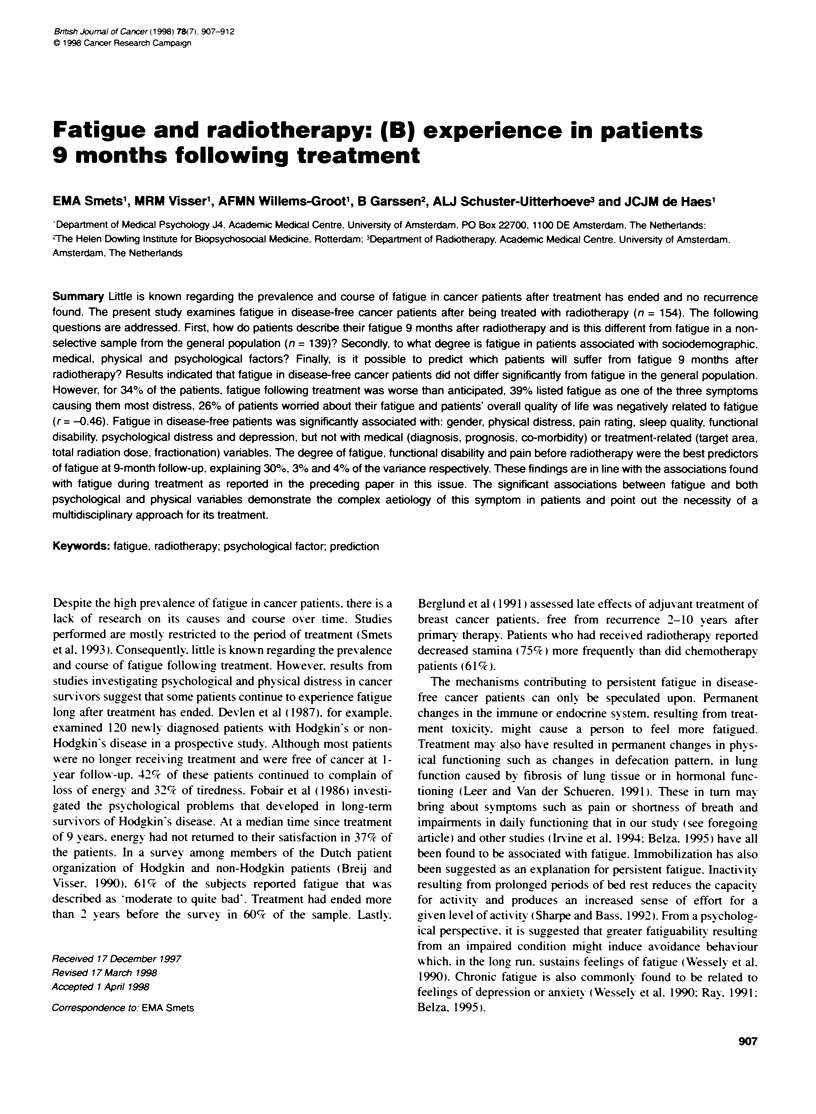
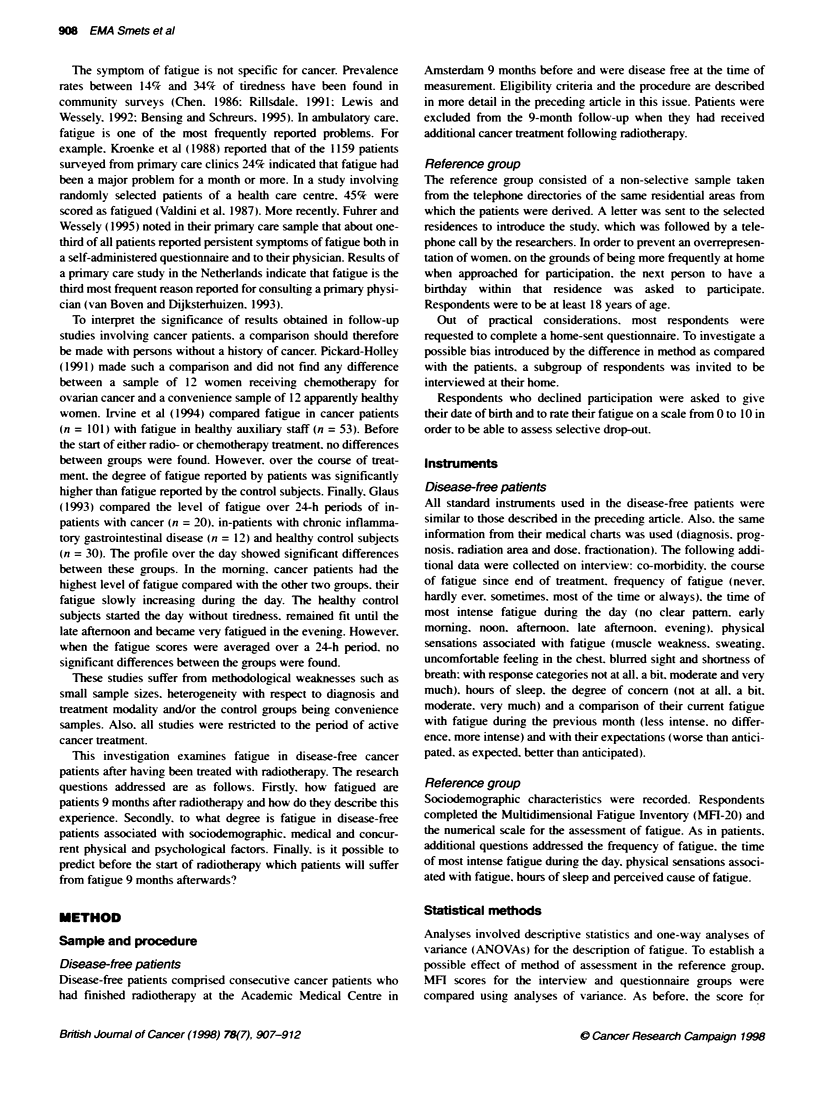
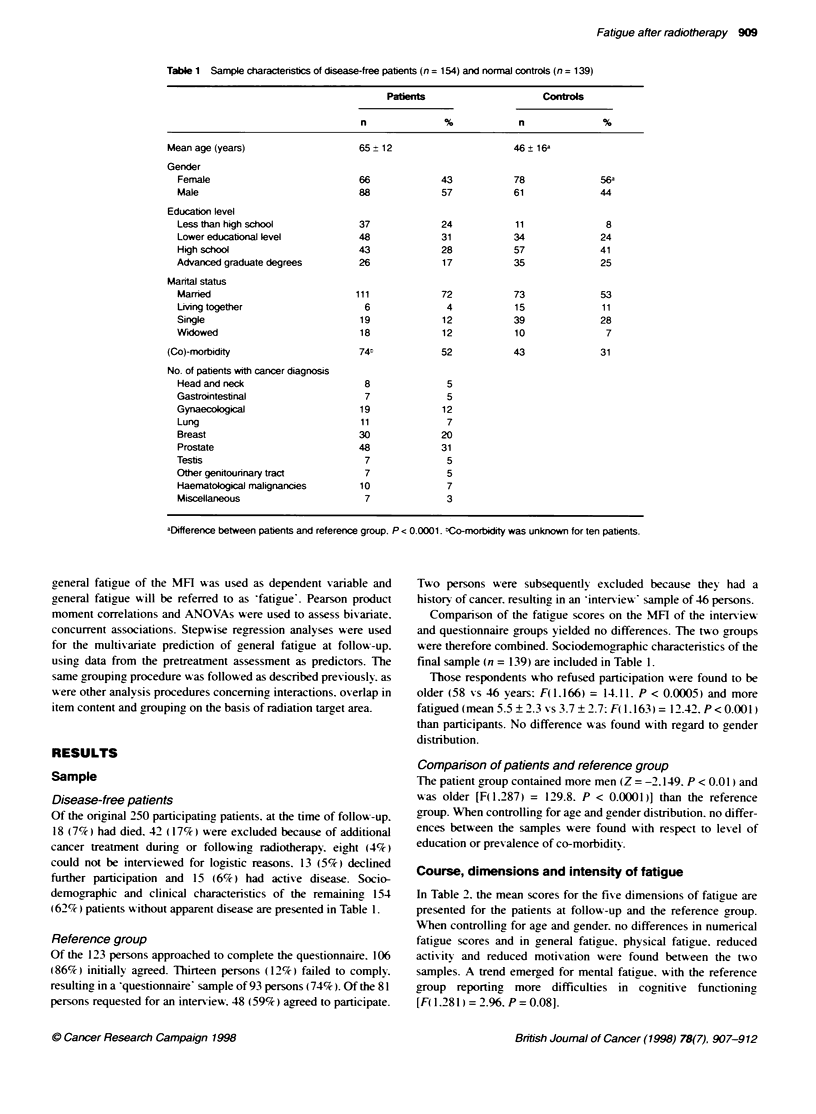
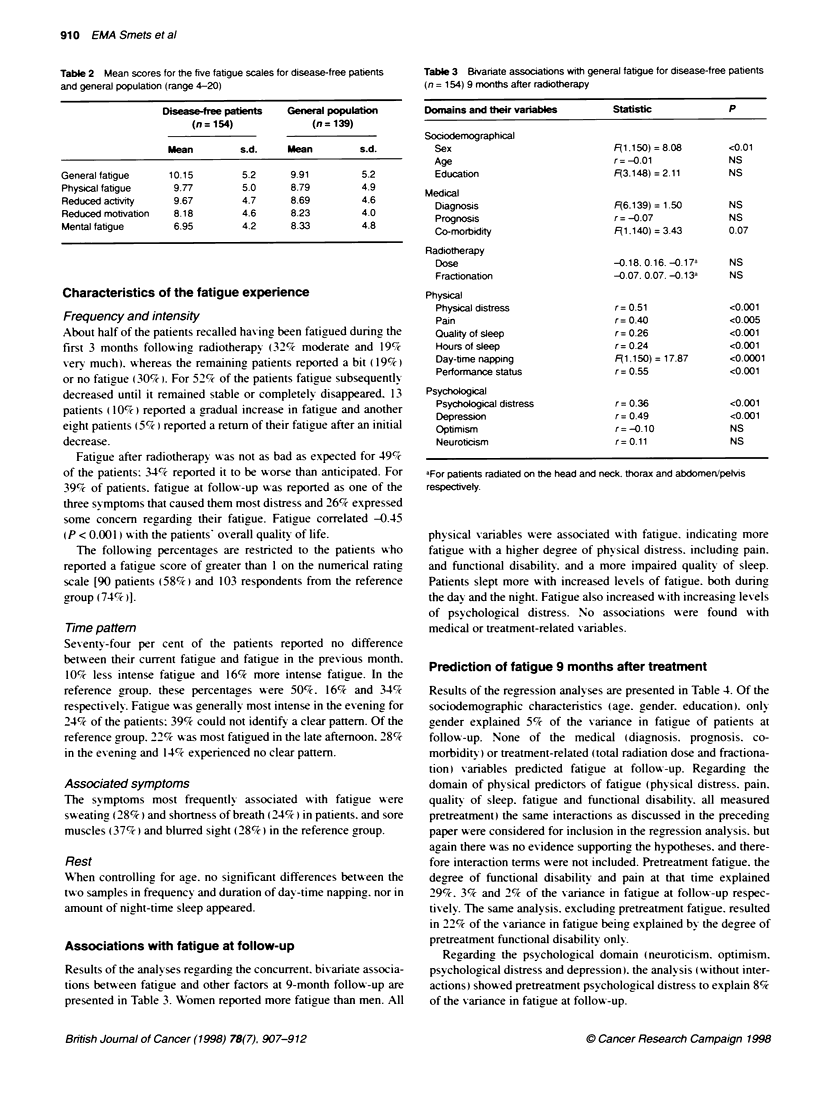
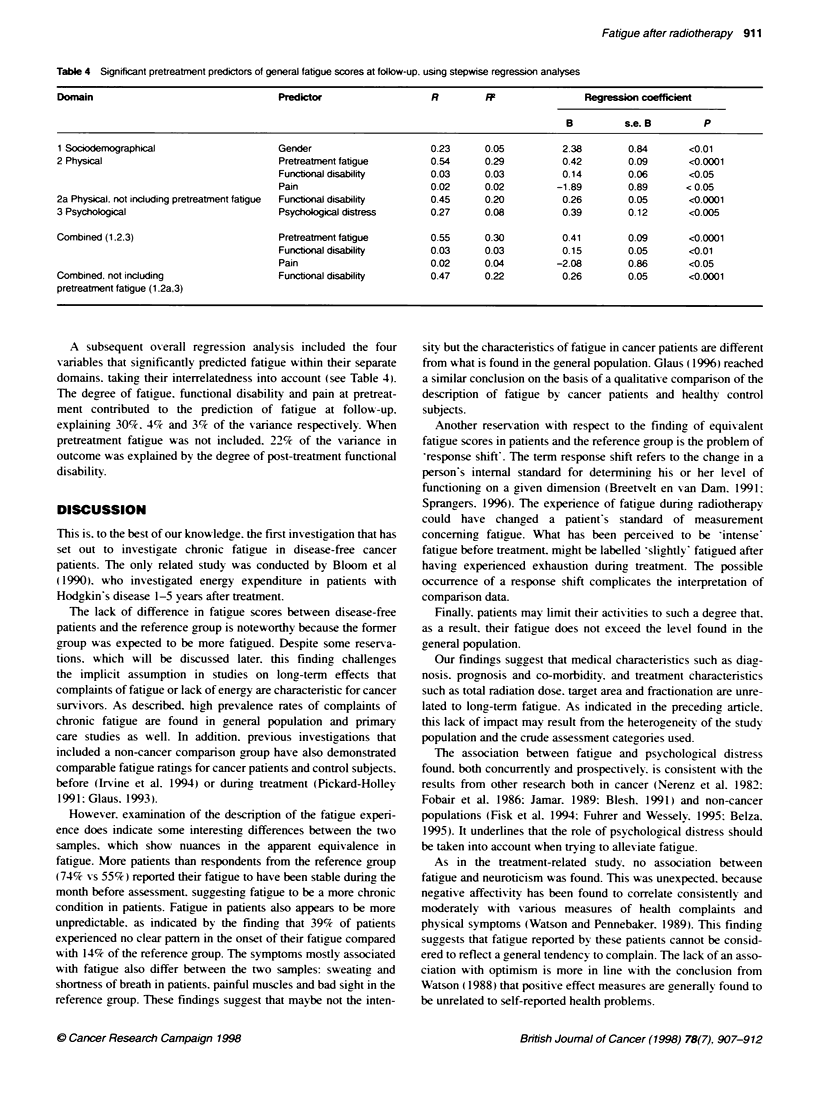
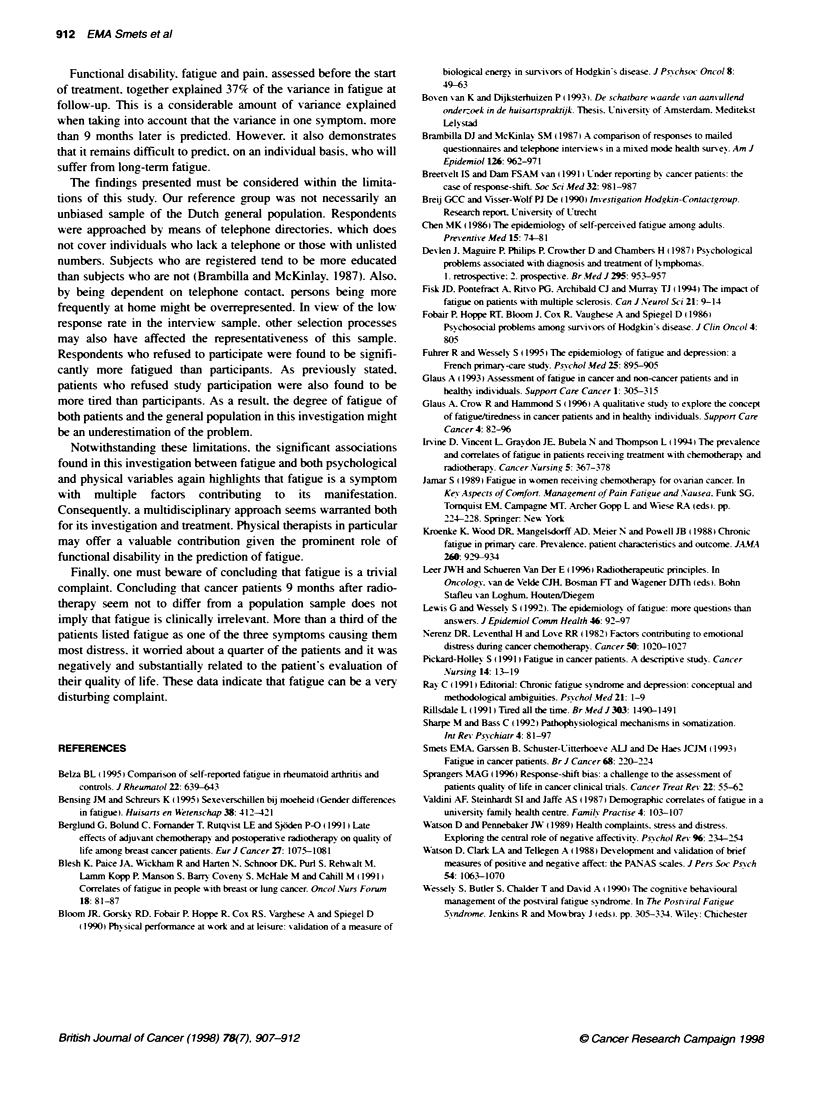
Selected References
These references are in PubMed. This may not be the complete list of references from this article.
- Belza B. L. Comparison of self-reported fatigue in rheumatoid arthritis and controls. J Rheumatol. 1995 Apr;22(4):639–643. [PubMed] [Google Scholar]
- Berglund G., Bolund C., Fornander T., Rutqvist L. E., Sjödén P. O. Late effects of adjuvant chemotherapy and postoperative radiotherapy on quality of life among breast cancer patients. Eur J Cancer. 1991;27(9):1075–1081. doi: 10.1016/0277-5379(91)90295-o. [DOI] [PubMed] [Google Scholar]
- Blesch K. S., Paice J. A., Wickham R., Harte N., Schnoor D. K., Purl S., Rehwalt M., Kopp P. L., Manson S., Coveny S. B. Correlates of fatigue in people with breast or lung cancer. Oncol Nurs Forum. 1991 Jan-Feb;18(1):81–87. [PubMed] [Google Scholar]
- Brambilla D. J., McKinlay S. M. A comparison of responses to mailed questionnaires and telephone interviews in a mixed mode health survey. Am J Epidemiol. 1987 Nov;126(5):962–971. doi: 10.1093/oxfordjournals.aje.a114734. [DOI] [PubMed] [Google Scholar]
- Breetvelt I. S., Van Dam F. S. Underreporting by cancer patients: the case of response-shift. Soc Sci Med. 1991;32(9):981–987. doi: 10.1016/0277-9536(91)90156-7. [DOI] [PubMed] [Google Scholar]
- Chen M. K. The epidemiology of self-perceived fatigue among adults. Prev Med. 1986 Jan;15(1):74–81. doi: 10.1016/0091-7435(86)90037-x. [DOI] [PubMed] [Google Scholar]
- Fisk J. D., Pontefract A., Ritvo P. G., Archibald C. J., Murray T. J. The impact of fatigue on patients with multiple sclerosis. Can J Neurol Sci. 1994 Feb;21(1):9–14. [PubMed] [Google Scholar]
- Fobair P., Hoppe R. T., Bloom J., Cox R., Varghese A., Spiegel D. Psychosocial problems among survivors of Hodgkin's disease. J Clin Oncol. 1986 May;4(5):805–814. doi: 10.1200/JCO.1986.4.5.805. [DOI] [PubMed] [Google Scholar]
- Fuhrer R., Wessely S. The epidemiology of fatigue and depression: a French primary-care study. Psychol Med. 1995 Sep;25(5):895–905. doi: 10.1017/s0033291700037387. [DOI] [PubMed] [Google Scholar]
- Glaus A., Crow R., Hammond S. A qualitative study to explore the concept of fatigue/tiredness in cancer patients and in healthy individuals. Support Care Cancer. 1996 Mar;4(2):82–96. doi: 10.1007/BF01845757. [DOI] [PubMed] [Google Scholar]
- Irvine D., Vincent L., Graydon J. E., Bubela N., Thompson L. The prevalence and correlates of fatigue in patients receiving treatment with chemotherapy and radiotherapy. A comparison with the fatigue experienced by healthy individuals. Cancer Nurs. 1994 Oct;17(5):367–378. [PubMed] [Google Scholar]
- Kroenke K., Wood D. R., Mangelsdorff A. D., Meier N. J., Powell J. B. Chronic fatigue in primary care. Prevalence, patient characteristics, and outcome. JAMA. 1988 Aug 19;260(7):929–934. [PubMed] [Google Scholar]
- Nerenz D. R., Leventhal H., Love R. R. Factors contributing to emotional distress during cancer chemotherapy. Cancer. 1982 Sep 1;50(5):1020–1027. doi: 10.1002/1097-0142(19820901)50:5<1020::aid-cncr2820500534>3.0.co;2-j. [DOI] [PubMed] [Google Scholar]
- Smets E. M., Garssen B., Schuster-Uitterhoeve A. L., de Haes J. C. Fatigue in cancer patients. Br J Cancer. 1993 Aug;68(2):220–224. doi: 10.1038/bjc.1993.319. [DOI] [PMC free article] [PubMed] [Google Scholar]
- Sprangers M. A. Response-shift bias: a challenge to the assessment of patients' quality of life in cancer clinical trials. Cancer Treat Rev. 1996 Jan;22 (Suppl A):55–62. doi: 10.1016/s0305-7372(96)90064-x. [DOI] [PubMed] [Google Scholar]
- Valdini A. F., Steinhardt S. I., Jaffe A. S. Demographic correlates of fatigue in a university family health centre. Fam Pract. 1987 Jun;4(2):103–107. doi: 10.1093/fampra/4.2.103. [DOI] [PubMed] [Google Scholar]
- Watson D., Clark L. A., Tellegen A. Development and validation of brief measures of positive and negative affect: the PANAS scales. J Pers Soc Psychol. 1988 Jun;54(6):1063–1070. doi: 10.1037//0022-3514.54.6.1063. [DOI] [PubMed] [Google Scholar]


